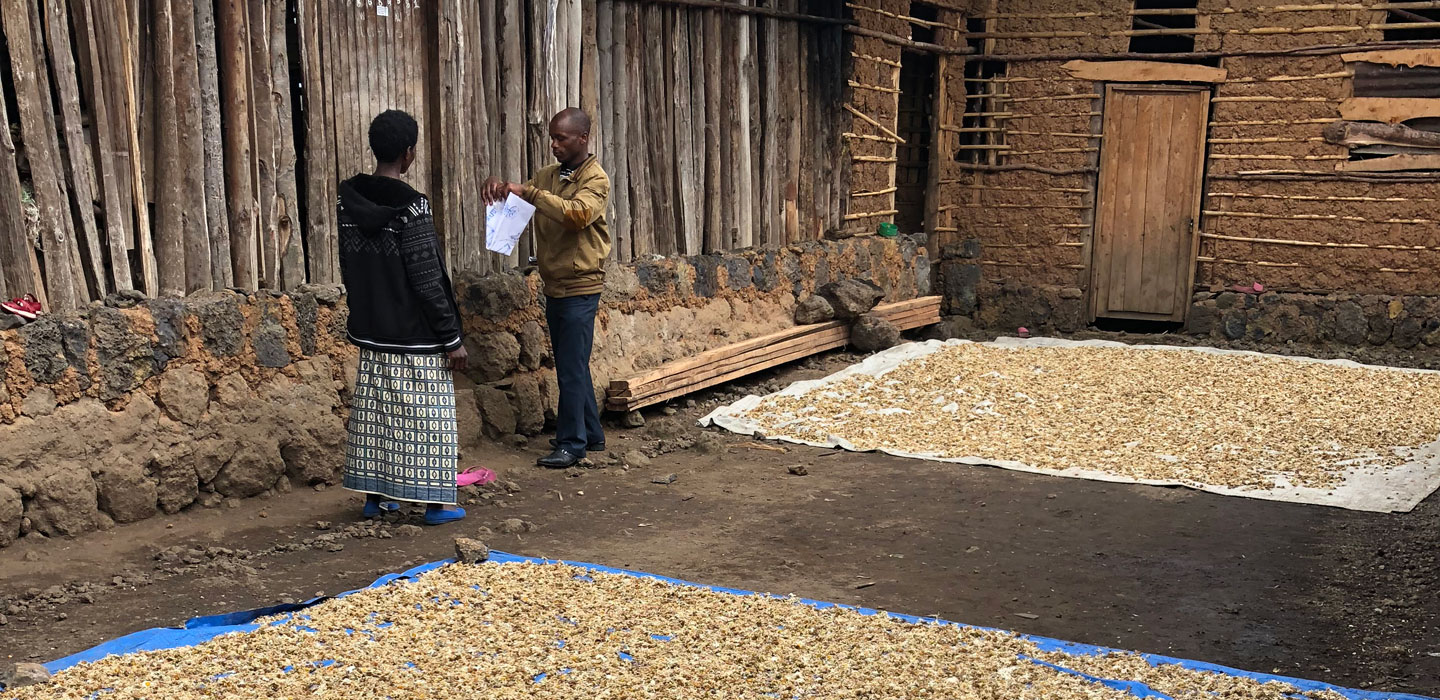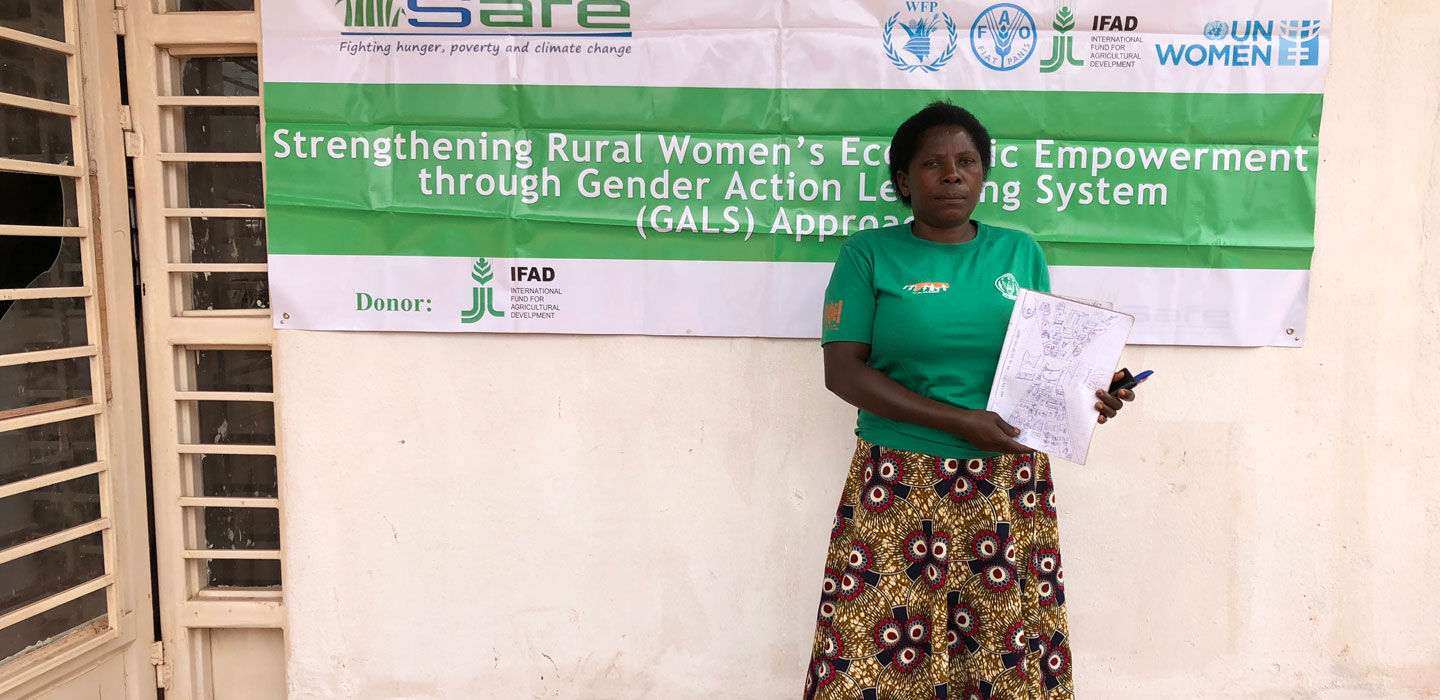Change starts at home – Addressing gender imbalances and climate issues through household methodologies
IFAD Asset Request Portlet
Asset Publisher
Change starts at home – Addressing gender imbalances and climate issues through household methodologies
Estimated reading time: 4 minutes
© Petra Järvinen
IFAD is piloting the use of household methodologies (HHMs) for gender equality and climate change adaptation as a way to accelerate progress towards the economic empowerment of rural women in Rwanda. The Gender Action Learning System (GALS) is being piloted in five districts and provides a unique opportunity to improve gender equality while promoting climate smart activities.
Men and women have diverse ways of coping and adapting to the adverse impacts of climate change. These are shaped to a high degree by gender inequalities in the country, in particular by women's unequal access to social and economic resources. To address this climate challenges and solutions are identified that are specific to men and women, as well as solutions that they can take together.
One approach is though household methodologies (HHMs) that encourage change at the household level by challenging underlying social norms, attitudes and behaviours. In Rwanda, IFAD has been piloting the use of the Gender Action Learning System which is a specific household methodology. It uses visual materials and diagram tools to encourage people taking part to think about their current life situations and to start planning and visualising their future.
Typically, GALS is used for generating gender transformative changes and improved intra-household gender relations. As a new approach, IFAD is also piloting GALS to strengthen the mitigation measures and adaptive capacities of households and communities to climate change. It includes using the traditional GALS tools with an integrated climate component. Through this method, it is possible to engage both women and men in identifying the specific climate related challenges they face and to discover possible solutions.
The transformational techniques includes identifying areas of change at household level to build more climate resilience and selecting specific champions from the rural communities to share their learning and to train others. These champions are usually not in leadership positions, but are selected because they themselves will also benefit from the methodology. The GALS methods also encourage the uptake of climate-smart techniques, which the smallholder farmers might already be aware of but have not yet implemented.

"I know now that my children appreciate all that I do for them"
One of the champions is Francine from the Kirehe district, which is located in the south-east of Rwanda. She lost her husband ten years ago and has had to manage the family’s farm and provide for her three children alone. Although the children are now adults with children of their own, Francine continues to support them economically.
Over the last few years, Francine has been noticing the worsening effects of climate change on her small plot of land. Prolonged droughts have had an especially devastating impact on the harvests in Kirehe, and she has struggled to maintain her crop production. In addition to the challenges Francine faces on her farm, she also struggles with health complications due to her status as HIV positive. She has experienced discrimination by her neighbours and has been unable to rely on her community for help during the dry season.
Recently though, Francine has been able to take more control of her life through the GALS activities. Her relationship with her children has improved as they have used the various GALS tools together at home to address tensions and to create more trust among each other.
"The tool has encouraged my family to reflect and discuss our disputes in a more open way and it has helped us to share also all the positive things we like about each other," Francine says. She now feels that her children respect her more and that the dynamics in the family have improved significantly. She has also been able to improve her position in the community by analysing and addressing with GALS some of the difficult situations with her neighbours and standing up for herself.
"The neighbours used to treat me very badly and that made me angry and resentful. After becoming a GALS champion I have tried to reflect on my own attitude and create more harmony in the community".
This has had a positive impact in her relationship with her neighbours and she can now borrow community goods, such as jerry cans for fetching water, and her grandchildren are able to play with the other children in the village.
With the help of GALS methods, women become powerful agents of change in their households and communities as they learn how to collect and analyse information necessary for mitigating and tackling climate change related impacts. Francine too has implemented a number of climate-smart techniques on her land. She has planted trees to tackle erosion and improved the water harvesting system on the farm to prepare for drought. In the future, Francine hopes to continue investing and to train others in the village on GALS tools.
The GALS pilot is part of a wider IFAD intervention under the Joint Programme Accelerating Progress towards the Economic Empowerment of Rural Women. It is a joint initiative by FAO, IFAD, WFP and UN Women with the overarching goal of securing rural women’s livelihoods and rights in order to achieve sustainable development in Ethiopia, Guatemala, Kyrgyzstan, Liberia, Nepal, Niger and Rwanda. The programme builds on best practices and comparative strengths of the agencies to improve the status of women in rural areas. IFAD's GALS pilot supports these efforts by establishing sustainable transformations at household level and initiating mind-set changes, which will also facilitate the adoption of climate-smart techniques promoted by the other three UN agencies.
Publication date: 10 January 2019